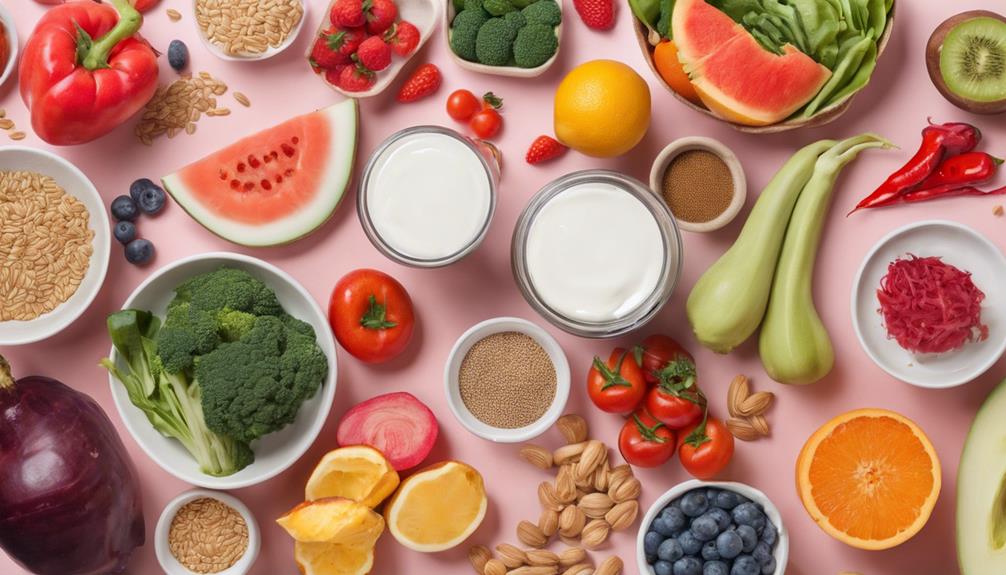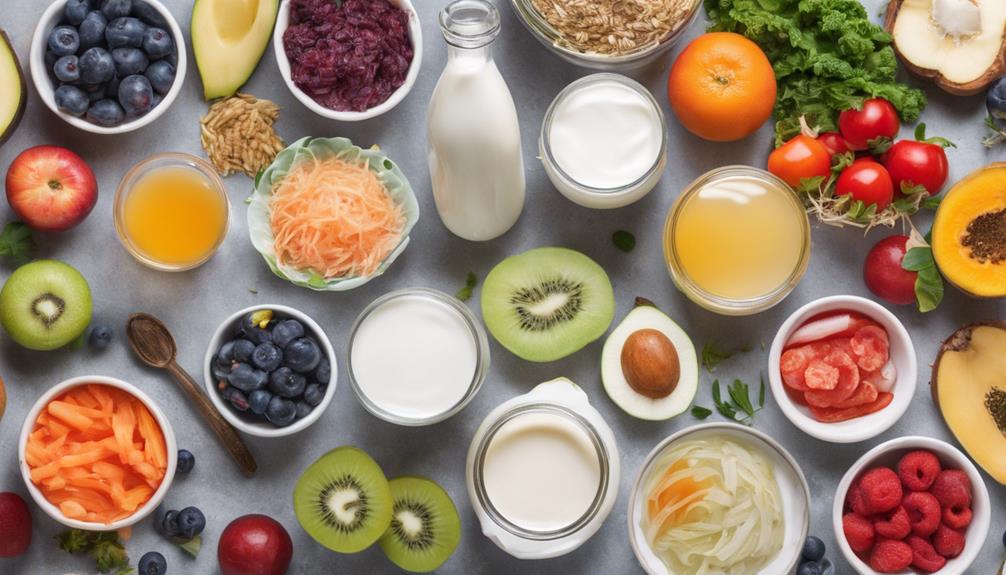How to Maintain a Healthy Gut With These Simple Dietary Tips for Women
When it comes to your gut health, think of it as the root of your overall wellness, anchoring your body's equilibrium. By making simple dietary adjustments, you can nurture this vital system and enhance your health in myriad ways. From incorporating fiber-rich foods to practicing mindfulness in your eating habits, each step plays a crucial role in maintaining a healthy gut. Stay tuned to uncover the transformative impact these dietary tips can have on your well-being.
Importance of Gut Health
Maintaining a healthy gut is crucial for overall well-being, especially for women. Your gut health plays a significant role in the communication between your gut and brain, known as the gut-brain connection. This connection impacts your mood, stress levels, and even cognitive function.
Furthermore, a healthy gut is essential for a robust immune system, as around 70% of your immune cells reside in the gut.
To ensure optimal gut health, it's vital to support your digestive system with the right tools. Digestive enzymes are key players in breaking down food and aiding in nutrient absorption. Additionally, your gut microbiota, the community of microorganisms living in your intestines, influence various aspects of your health, from digestion to immunity.
Fiber-Rich Foods
Regularly consuming fiber-rich foods is essential for promoting optimal gut health. Fiber acts as a prebiotic, providing nourishment for the beneficial bacteria in your gut. Incorporating gut-friendly snacks like almonds, chia seeds, and berries into your diet can significantly contribute to digestive wellness. These foods not only help regulate bowel movements but also support a healthy microbiome, which plays a crucial role in overall health.
In addition to promoting regularity, fiber-rich foods can aid in weight management by keeping you feeling full longer and reducing cravings for unhealthy snacks. They also help lower cholesterol levels and regulate blood sugar levels, which are vital for preventing chronic diseases.
To ensure you're getting enough fiber, aim to include a variety of fruits, vegetables, whole grains, and legumes in your daily meals and snacks. By making these simple dietary adjustments, you can improve your gut health and overall well-being.
Probiotic-Rich Foods
To support a healthy gut, incorporating probiotic-rich foods into your diet is key. Probiotics are beneficial bacteria that help maintain a balanced gut microbiota, supporting a healthy digestive system.
Yogurt is a well-known source of probiotics, with live active cultures that can aid in digestion. Kefir, a fermented milk drink, is another excellent option packed with probiotics to promote gut health.
Kimchi and sauerkraut are traditional fermented foods that can introduce a variety of beneficial bacteria to your gut microbiota, aiding in the overall health of your digestive system. Additionally, miso and tempeh are fermented soy products that offer probiotic benefits.
Hydration Tips
For optimal health and proper bodily function, staying well-hydrated is essential. Adequate water intake supports numerous bodily functions and promotes overall well-being. Here are some hydration tips to help you maintain a healthy gut and feel your best:
- Monitor your water intake: Pay attention to your daily water consumption. Aim to drink at least 8-10 glasses of water per day to support digestion, nutrient absorption, and detoxification processes.
- Hydration benefits for gut health: Drinking enough water helps maintain the mucosal lining of the intestines, supports the balance of good bacteria, and aids in the smooth movement of food through the digestive tract.
- Stay hydrated throughout the day: Carry a reusable water bottle with you to ensure you can sip water regularly. Hydrating consistently can prevent dehydration, which can lead to digestive issues and discomfort.
Mindful Eating Practices
Maintaining a healthy gut involves not only staying hydrated but also practicing mindful eating habits. Intuitive eating and mindfulness practices can significantly impact digestive wellness by fostering a strong gut-brain connection.
When you eat, try to be fully present in the moment. Focus on the flavors, textures, and smells of your food. Avoid distractions like screens or eating on the go. By being mindful during meals, you can better listen to your body's hunger and fullness cues, promoting a healthier relationship with food. Additionally, chewing your food thoroughly aids digestion and nutrient absorption.
To enhance your mindful eating practices, try to eat slowly and savor each bite. This approach can help prevent overeating and reduce digestive discomfort. Pay attention to how different foods make you feel; this awareness can guide your food choices to ones that support your gut health.
Gut-Supporting Herbs
Incorporating gut-supporting herbs into your daily routine can play a crucial role in promoting digestive health and overall well-being. Herbal remedies have been used for centuries to aid digestion and soothe the gut. Here are some natural options to consider:
- Herbal Tea Blends: Sipping on herbal teas like chamomile, peppermint, or ginger can help calm inflammation and support healthy digestion.
- Gut Soothing Supplements: Look for supplements containing ingredients like slippery elm, marshmallow root, or aloe vera, known for their soothing properties on the digestive system.
- Digestive Bitters: These herbal extracts can stimulate digestive juices, promoting better digestion and nutrient absorption.
Consider incorporating these natural remedies into your daily routine to support your gut health. Whether enjoyed as herbal tea blends, taken as gut-soothing supplements, or used in the form of digestive bitters, these herbs can provide gentle yet effective support for your digestive system.
Avoiding Processed Foods
To further enhance your gut health and overall well-being, steering clear of processed foods is paramount. When it comes to maintaining a healthy gut, the quality of the food you consume plays a significant role. Processed foods often contain high levels of sugar, unhealthy fats, and artificial additives that can disrupt the balance of your gut microbiota. When shopping, always take the time to read labels carefully. Look out for ingredients that you can't pronounce or recognize, as these are typically indicators of heavily processed products.
Instead of processed foods, opt for whole grains to support your gut health. Whole grains like brown rice, quinoa, and oats are rich in fiber, vitamins, and minerals that nourish your gut bacteria and promote a healthy digestive system. By choosing whole grains over refined grains found in processed foods, you provide your gut with the nutrients it needs to thrive.
Making these simple changes to your diet can have a significant impact on your gut health in the long run.
Prebiotic Foods
Including prebiotic foods in your diet is essential for nurturing a healthy gut environment. Prebiotics are non-digestible fibers that serve as food for the beneficial bacteria in your gut microbiota, promoting digestive health and overall well-being.
Here are three prebiotic foods you can easily incorporate into your daily meals:
- Chicory Root: Rich in inulin, a type of prebiotic fiber, chicory root helps support the growth of healthy gut bacteria, aiding in digestion and nutrient absorption.
- Garlic: Not only does garlic add flavor to your dishes, but it also contains prebiotic properties that can enhance the diversity of your gut microbiota, contributing to a healthy gut environment.
- Bananas: Bananas are a convenient and delicious source of prebiotics, such as resistant starch and pectin, which can help feed the good bacteria in your gut, promoting optimal digestive health.
Managing Stress Levels
Managing stress levels is crucial for maintaining a healthy gut as stress can significantly impact your digestive system. When you're stressed, your body releases hormones that can disrupt the balance of bacteria in your gut, leading to digestive issues. To help manage stress and support your gut health, consider incorporating meditation practices and breathing exercises into your daily routine.
Meditation practices, such as mindfulness meditation or guided imagery, can help calm your mind and reduce stress levels. Taking just a few minutes each day to sit quietly, focus on your breath, and be present in the moment can have a profound impact on both your mental well-being and your gut health.
Additionally, simple breathing exercises, like deep diaphragmatic breathing or alternate nostril breathing, can help activate your body's relaxation response, lowering cortisol levels and promoting better digestion. By making these practices a regular part of your self-care routine, you can better manage stress and support a healthier gut.
Balancing Macronutrients
Balancing macronutrients is essential for supporting a healthy gut and overall well-being. To ensure your body gets the right mix of nutrients, consider the following tips:
- Protein Ratios: Aim to include a variety of protein sources in your diet, such as lean meats, fish, legumes, and dairy products. These foods provide essential amino acids that help support gut health and repair tissues.
- Carbohydrate Sources: Opt for complex carbohydrates like whole grains, fruits, and vegetables, which are rich in fiber. Fiber helps promote a healthy gut by supporting beneficial bacteria and aiding digestion.
- Healthy Fats: Incorporate sources of healthy fats like avocados, nuts, seeds, and olive oil into your meals. These fats are essential for nutrient absorption and can help reduce inflammation in the gut.
Frequently Asked Questions
Can Gut Health Affect Mental Health and Mood?
Yes, gut health can impact mental health and mood through the gut-brain connection. A healthy gut contributes to emotional well-being. Probiotics, fiber-rich foods, and managing stress can support this link, improving your overall mental and emotional health.
How Does Hydration Impact Gut Health?
Staying hydrated is vital for your gut health. Hydration levels directly impact the balance of your gut microbiome, aiding digestion and nutrient absorption. Ensure you drink enough water daily to support a healthy gut and overall well-being.
Are Fermented Foods the Same as Probiotics?
You may wonder if fermented foods equate to probiotics. While both aid the gut microbiome, fermented foods contain live cultures that may not survive digestion, unlike probiotics. Understanding this distinction is crucial for nurturing your gut-brain axis.
Can Gut Health Influence Weight Loss Efforts?
Your gut bacteria play a vital role in weight management. A balanced gut promotes a healthy metabolism, aiding weight loss efforts. By incorporating fiber-rich foods and probiotics, you can support your gut health and enhance your weight loss journey.
What Role Do Antioxidants Play in Gut Health?
Antioxidants are crucial for gut health, reducing inflammation and supporting the gut-brain connection. They combat free radicals, promoting a balanced microbiome. Incorporate colorful fruits, veggies, nuts, and seeds into your diet for antioxidant benefits and overall gut well-being.
Conclusion
Just like a well-tended garden yields abundant fruits, nurturing your gut health will lead to a bountiful harvest of overall well-being. By incorporating fiber-rich foods, probiotics, staying hydrated, and practicing mindful eating, you are sowing the seeds for a healthy gut. Remember, taking care of your gut is like tending to a precious garden – with the right nourishment and care, you will reap the benefits of a thriving and balanced internal ecosystem.














